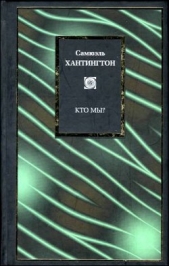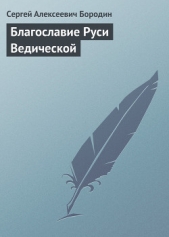Кто мы?

Кто мы? читать книгу онлайн
Новая книга Самюэля Хантингтона посвящена анализу ключевой для современного общественного сознания проблемы - определения идентичности. Приоритет общенационального самосознания особенно важен для страны, которую принято называть «плавильным тиглем народов», - Соединенных Штатов Америки. Однако сегодня в США набирают силу дезинтеграционные процессы, ставящие под сомнение сам факт дальнейшего существования феномена американской идентичности. Америка, как убедительно доказывает профессор Хантингтон, находится на переломе - и от того, в какую сторону в конце концов качнется маятник, зависит будущее не только Соединенных Штатов, но и всей мировой системы в целом.
Внимание! Книга может содержать контент только для совершеннолетних. Для несовершеннолетних чтение данного контента СТРОГО ЗАПРЕЩЕНО! Если в книге присутствует наличие пропаганды ЛГБТ и другого, запрещенного контента - просьба написать на почту [email protected] для удаления материала
426 Roderic Ai Camp, "Learning Democracy in Mexico and the United States", Mexican Studies, 19 (Winter 2003), p. 13; Carlos Fuentes, "Conversations with Rose Styron", New Perspectives Quarterly, Special Issue 1997, p.59-61; Andres Rozental quoted in Yossi Shain, Marketing the American Creed Abroad (Cambridge: Cambridge University Press, 1999), p. 189; Armando Cintaro, "Civil Society and Attitudes: The Virtues of Character", Annals AAPSS, 565 (September 1999), p. 145-146; Jorge Castaneda, "Ferocious Differences", Atlantic Monthly, 276 (July 1995), p. 71-76; Sosa, Americano Dream, chaps. 1, 6; Alex Villa quoted in Robert D. Kaplan, "Travels into America's Future", Atlantic Monthly, 282 (July 1998), p. 60-61.
427 New York Times, 3 May 1998, p. 26; New York Times, 19 September 1999, p. 18.
428 New York Times, 17 July 2000, p. A20.
429 Sosa, American Dream, p. 205-207, 211.
430 Washington Post, 8 September 1996, p. X03; Washington Post, 17 August 2000, p. C4.
431 Georgiy Arbatov, "Preface", in Richard Smoke and Andrei Kortunov, eds., Mutual Security: A New Approach to
620
Soviet-American Relations (New York: St. Martin's, 1991), p. xxi; The original version of this quotation was slightly different, New York Times, 8 December 1987, p. 38.
432 David M. Kennedy, "Culture Wars: The Sources and Uses of Enmity in American History", in Ragnhild Fiebig-von Hase and Ursula Lehmkuhl, eds., Enemy Images in American History (Providence, RI: Berghahn, 1997), p. 355; John Updike, Rabbit at Rest (New York: Alfred A. Knopf, 1990), p. 442-43.
433 "Waiting for the Barbarians", by С. Р. Cavafy, from Six Poets of Modern Greece, edited by Edmund Keeley and Philip Sherrard, (New York: Alfred A. Knopf, 1968). Reprinted with permission from Thames Hudson, London. For one typical use of this poem, see Col. S. Nelson Drew, USAF, NATO From Berlin to Bosnia: Trans-Atlantic Security in Transition (Washington: National Defense University, Institute for National Strategic Studies, McNair Paper 35, January 1995), p. 36.
434 Bruce D. Porter, "Can American Democracy Survive?" Commentary, 96 (November 1993), p. 37-40; Robert Putnam, Bowling Alone: The Collapse and Revival of American Community (New York: Simon Schuster, 2000), p. 272, 267-68; Philip A. Klinker and Rogers M. Smith, The Unsteady March: The Rise and Decline of Racial Equality in America (Chicago: University of Chicago Press, 1999); Michael С Desch, "War and Strong States, Peace and Weak States?" International Organization, 50 (Spring 1996), p. 237-68.
435 Daniel Deudney and G. John Ikenberry, "After the Long War", Foreign Policy, 94 (Spring 1994), p. 29
436 Paul E. Peterson, "Some Political Consequences of the End of the Cold War" (Cambridge: Harvard University, Center for International Affairs, Trilateral Workship on Democracy, Memorandum, 23-25 September 1994), p. 4-9.
437 John W. Dower, War Without Mercy: Race and Power in the Pacific War (New York: Pantheon, 1986), p. 10; John Hersey, Into the Valley: A Skirmish of the Marines (New York: Knopf, 1943), p. 56; Kennedy, "Culture Wars", in Enemy Images, p. 354—55.
621
438 Charles Krauthammer, "Beyond the Cold War", New Republic, December 19, 1988, p. 18.
439 U. S. Department of State, Office of Counterterrorism, "Foreign Terrorist Organizations", 23 May 2003, and "Overview of State-Sponsored Terrorism, 30 April 2003; Boston Globe, 7 May 2002, p. A19.
440 Steve Farkas et al, A Lot to Be Thankful for: What Parents Want Children to Learn About America (New York: Public Agenda, 1998), p. 10.
441 "How Global Is My Company?" Communique, Global Business Policy Council, A.T. Kearny, No. 2 (Fourth Quarter, 2000), p. 3.; Statement by John Davey, Directorate of Intelligence Analysis, television interview, 11 March 1999.
442 Adam Smith, An Inquiry into the Nature and Cause of the Wealth of Nations (Chicago: University of Chicago, 1976), vol. 2, p. 375-76, quoted in Walter Berns, Making Patriots (Chicago: University of Chicago Press, 2001), p. 59-60.
443 James Davison Hunter and Josh Yates, "In the Vanguard of Globalization: The World of American Globalizers", in Peter L. Berger and Samuel Huntington, eds., Many Globalizations: Cultural Diversity in the Contemporary World (New York: Oxford University Press, 2000), p. 352-57, 345.
444 John Micklethwait and Adrian Wooldridge, A Future Perfect: The Challenge and Hidden Promise of Globalization (New York: Crown Business, 2000), p. 235; "How Global Is My Company?" Global Business Policy Council, p. 4.
445 Quoted in Hunter and Yates, "In the Vanguard of Globalization", in Many Globalizations, p. 344.
446 Manuel Castells, The Rise of the Network Society, 1 (Cambridge: Blackwell, 1996), p. 415, quoted in Micklethwait and Wooldridge, A Future Perfect, p. 242.
447 Adam Clymer, "The Nation's Mood", New York Times Magazine, December 11, 1983, p. 47.
448 Robert B. Reich, "What Is a Nation?", Political Science Quarterly, 106(Summer 1991), p. 193-94; Alan Wolfe, "Alien Nation", New Republic, 26 March 2001, p. 36; Micklethwait and Wooldridge, A Future Perfect, p. 241-42.
622
449 Martha Nussbaum, "Patriotism and Cosmopolitanism", in Martha C. Nussbaum et al, For Love of Country: Debationg the Limits of Patriotism (Boston: Beacon Press, 1996), p. 4-9; Amy Gutmann, "Democratic Citizenship", ibid., p.68-69; Richard Sennett, "America Is Better Off Without a 'National Identity'", International Herald Tribune, 31 January 1994, p. 6; George Lipsitz, "Dilemmas of Beset Nationhood: Patriotism, the Family, and Economic Change in the 1970s and 1980s", in John Bodnar, ed., Bonds of Affection: Americans Define Their Patriotism (Princeton: Princeton University Press, 1996), p. 256; Cecilia E. O'Leary, "'Blood Brotherhood': The Racialization of Patriotism, 1865-1918", in Bodnar, ed., Bonds of Affection, p. 55ff; Betty Jean Craige, American Patriotism in a Global Society (Albany: State University of New York Press, 1996), p. 35-36; Peter Spiro, "New Global Communities: Non-Governmental Organizations in International Decision-Making Institutions", Washington Quarterly, (18 Winter 1995), p. 45.
450 Cm. Jeremy A. Rabkin, Why Sovereignty Matters (Washington, D.C.: AEI Press, 1998), p. 51ff; Filartiga v. Pena-Irala, 630 F.2d 876 (2nd Cir., 1980).
451 Rabkin, Why Sovereignty Matters, p.56-58, 138.
452 Richard Rorty, Achieving Our Country: Leftist Thought in Twentieth-Century America (Cambridge: Harvard University Press, 1998), p. 15; Richard Rorty, "The Unpatriotic Academy", New York Times, 13 February 1994, p. E15; Robert Bellah, The Broken Covenant: American Civil Religion in Time of Trial (Chicago: University of Chicago Press, 1992), p. xii—xiii.
453 Strobe Talbott, "The Birth of the Global Nation", Time, 20 July 1992, p. 20.
454 Washington Post, 16-20 June 1989, ABC- Washing ton Post poll, September 2002, reported in New York Times, 6 July 2003, section 4, p. 1.
455 Ronald Inglehart et al., World Values Surveys and European Values Surveys, 1981-1984, 1990-1993, and 1995-1997, ICPSR version (Ann Arbor: Institute for Social Research, 2000).
456 Ibid.























